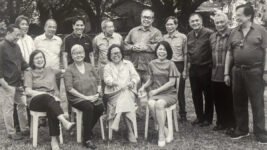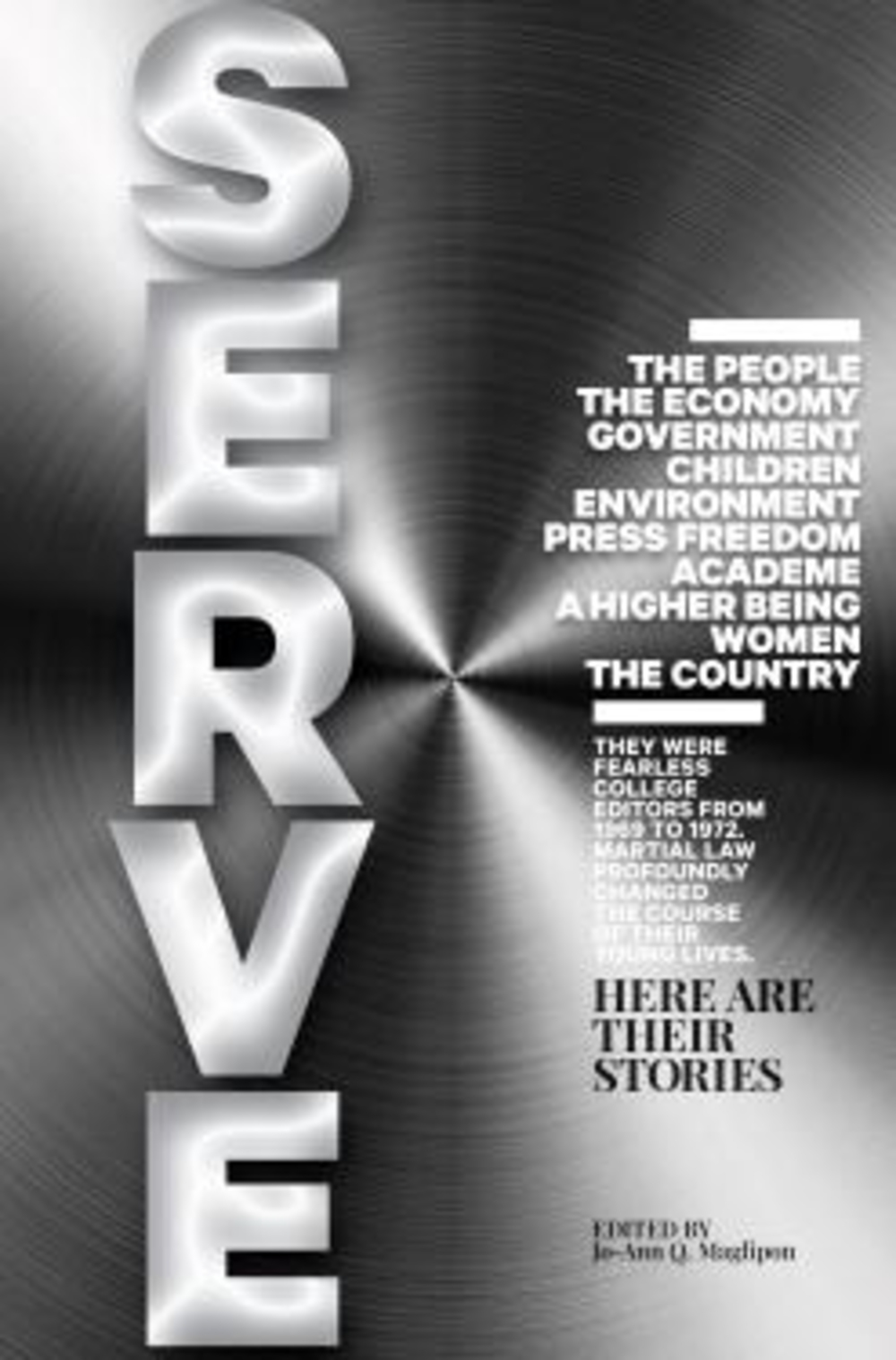
Celebrating SERVE: Lessons from the past and hope for the future
SERVE, a book edited by PEP.ph editor-in-chief Jo-Ann Q. Maglipon, has been nominated for 2024’s “Best Book in Journalism” Award.
This is on the occasion of the 42nd National Book Awards given by the National Book Development Board.
With SERVE, two other books nominated for the award are: COVID-19 IN THE NEWS by Ma. Ceres Doyo and VIEW FROM THE FOXHOLE by Jose Pablo D. Salud. Jo-Ann’s and Ceres’s books are published by the Ateneo de Manila University Press; Jose Pablo’s is published by the University of the Philippines Press.
SERVE chronicles the stories of 19 men and women who were college editors in the years 1969 to 1972, which go down as the tumultuous years leading up to the declaration of martial law in September 1972 by President Ferdinand Edralin Marcos.
The 19 write of the rule and regime that wiped out all forms of mass media, including campus papers, but go much further: they write not just of the gauntlet they had to get past and survive during martial law, but also of what went before and beyond that troubling period when the country’s laws were bent and young dreams were crushed.
Our editor-in-chief, Jo-Ann, started her journalism career in 1972, was forced underground in the years following the declaration, was interrogated incommunicado in Camp Aguinaldo, incarcerated for a year in Fort Bonifacio, and finally found her way back to journalism.
Her book, PRIMED, is a select anthology of her reportage from 1972-1992. It received the Gintong Aklat Award in 1998 from the Book Development Association of the Philippines, the largest publishers’ group in the country, which named it, for the period of 1988-1998, one of the “Ten Best Books of the Decade.”

Photo/s: Ateneo de Manila University Press
I have to admit I consumed SERVE only sporadically. Kasi, reading it in large doses spikes my blood pressure, hahah. I share the authors’ frustrations against the Marcoses and like-minded regimes, kaya ganun.
My favorite chapter, of course, is one that aligns with my advocacy as a feminist: “Words, Women, and Struggle: A Continuing Journey” by Dr. Judy M. Taguiwalo. I appreciate how it elaborated on the influential and consequential nature of the Word as the blueprint for advancing feminism to the heights it enjoys today.
Dr. Judy was twice imprisoned during martial law and gave birth to her first child in prison. She was secretary of the Department of Social Welfare and Development (DSWD), a position she lost after only a brief 14 months on the job. President Rodrigo Duterte left her to fend for herself with the Commission on Appointments, over which he had great influence. That he dropped her is evident in the way he would thereafter red-tag Dr. Judy in his public appearances.
I admire the life and ideas of this principled and brave feminist.
“SERVE” COMES AT THE PERFECT TIME
Favorites and frustrations aside, maybe the prolific interest comes from a place of guilty fascination.
I always thought about how “colorful” (in the sense of cinema-worthy and indelible) it was to be a protester during the Martial Law era. I imagine lightning in the veins, hearts racing, spirits soaring, guts ever-hardened, and about everything being so hauntingly epic just as it is all so terribly tragic.
The daydreaming is followed by the glaring question: “How do I square with myself the disparity when I haven’t contributed a fraction of what heroes at the time have accomplished?”
Hindi pelikula ang mala-pelikulang nangyari. Ito ay a piece of history that claimed so many lives and rights, and is on the brink of repeating itself if we fail to employ the lessons reaped.
This reflection brings out a deep sense of introspection in me. I recognize that, above all, I am Filipino.
Before I was registered as a member of my family clan, before I was baptized in a Catholic church, before I was affiliated with any of the schools I attended, and before I was blessed with the virtue of writing as a profession, I was, from the very moment I drew my first breath, first and foremost a Filipino.
This identity is the monolith of my response to both the book and the broader struggles addressed in its pages.
I find the fight these days to be less “colorful”—less espionage, more bureaucracy—but a fight against political evil nonetheless. Today, it doesn’t matter whether covert operations remain covert or whether there’s a camera at every turn.
Monsters will still inflict their damage without fear of being shunned by the masses. Their atrocities are headlights in the pitch-black darkness; even if these occur right in front of us, they leave us blind, and we still tend to follow them to find a way, ANY way.
It’s sickening. It’s nauseating.
Especially with the recent senate and congress hearings being conducted simultaneously. Sometimes, mapapa-“ignorance is bliss” ka na lang talaga, sa dami nang nauungkat na sana di mo na lang nalaman to preserve your peace.
SERVE couldn’t have come at a better time. It harks back to a time that is very much now.
Still, I refuse to believe that the Philippines is a lost cause. How can I, when years of protest have led us to a new age of enlightenment?
Yes, we are far from the liberty that Madam Jo-Ann and her colleagues have so tirelessly fought for, so faithfully dedicated their youth and prime to. But, as all headlights dim over time, so will the powers of the monsters.
Hopefully, new sources of light can course through these dark times for Filipinos. Hope is still within reach.
Nagkakamalay ulit ang pag-asa through works like SERVE.
Sana yung pondo na PHP10 million ibigay na lang for the publishing of SERVE hehe! It should find its way to today’s youth somehow.
READ MORE:



